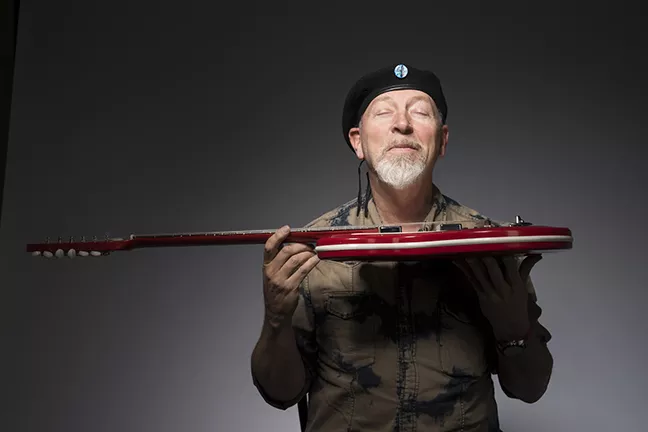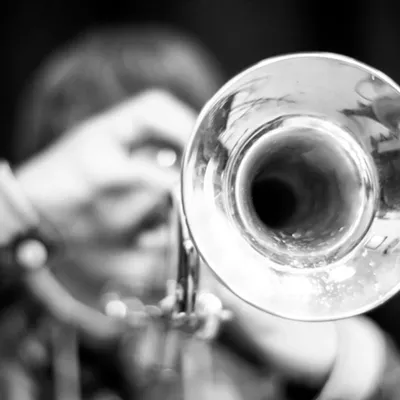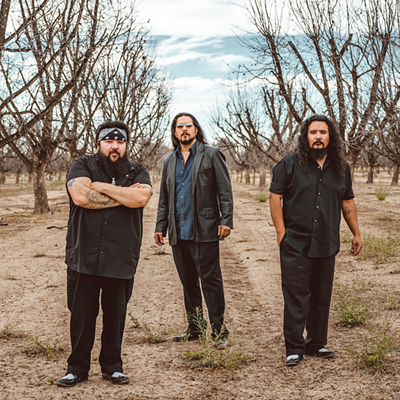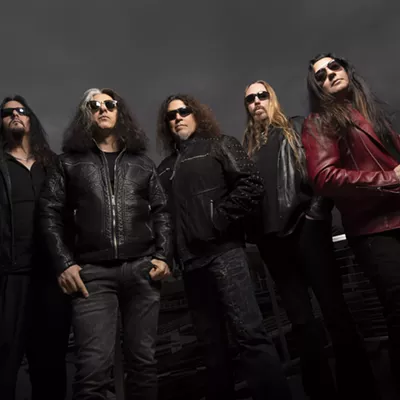At age 69, legendary guitarist and songwriter Richard Thompson has written and recorded hundreds of songs, but sometimes that creative force that drives his music remains a bit of a mystery.
Thompson's 18th solo studio album, 13 Rivers, is a bit of a feral beast, an all-electric record that rocks harder than he has in years. Released in September, the album is the product of a quick burst of writing, with Thompson saying the songs themselves came as a surprise to him.
"I don't know how the creative process works. I suppose it is some kind of bizarre parallel existence to my own life. I often look at a finished song and wonder what the hell is going on inside me," he says. "Things seemed to arrive very quickly on my plate. I look at some of these things and say where do they come from? They turned up from the subconscious, I think. I happily accept them and off we go."
The songs came to Thompson in a dark time, he says. First a couple, and he wasn't quite sure what direction they were pointing, but more came that seemed to have a commonality and he plowed away. Songwriting isn't necessarily a reaction to things in his life, Thompson says, but it can be an inevitable way of dealing with struggles.
"It is the way I process this stuff, whether consciously, semiconsciously, subconsciously, unconsciously," he says. "The songs seem to do that some how. But I don't think catharsis is the intention. It's a useful byproduct."
The album title speaks to the 13 songs, and to the natural way the songs seemed to flow, Thompson says, some faster, some slower, some on more of a winding current. As for any deeper meaning, Thompson says, "I think 13 Rivers you can take it to mean whatever you want."
"The songs are a surprise in a good way. They came to me as a surprise in a dark time. They reflected my emotions in an oblique manner that I'll never truly understand. It's as if they'd been channeled from somewhere else. You find deeper meaning in the best records as time goes on. The reward comes later."
Albums haven't always come together quickly for Thompson, who says some projects of his have taken years to come to fruition. It's often the nature of a project that dictates how the creative process goes.
"13 Rivers came quickly. It can feel different. It feels like something you haven't overthought," he says. "You don't really have time to second-guess yourself, which I kind of like. You slam it down as fast as you can and that's it. You can look at it later and say there are."
Thompson chose to produce 13 Rivers himself, the first time he's worked without an outside producer in more than a decade. On his last studio record of new material, Thompson worked with Wilco's Jeff Tweedy as producer, but on this batch of raw, emotionally direct songs, Thompson wanted the reins himself.
Recorded entirely analog in just 10 days, the album features Thompson's regular accompanists Michael Jerome on drums, Taras Prodaniuk on bass and Bobby Eichorn on guitar. Known for his versatility on guitar, Thompson is equally powerful on acoustic or electric. But this time out, he decided to play entirely electric.
"I looked at the songs and 11 out of 13 are up-tempo, so I wanted to make it an album that's basically electric, so there's a unity in it," he says. "It just seemed that way, so I thought that instead of taking one or two and making them acoustic, which would be a natural thing to do when they're slower, let's just keep the same instrumentation going and make them tougher."
The album opens with "The Storm Won't Come," which itself builds like a storm, the tribal rhythms of the drums building and building to the crescendo of a torrential guitar solo.
"It's a song about wanting change, but somehow you can't force it. You have to let nature take its course," he says. "You have to have some patience with it and let it happen when it happens. You know it's coming but you just don't know when it's coming, it's going to come."
There's an urgency in tone that carries across the album, even the more mellow songs, like "My Rock, My Rope" and "No Matter," and "Shaking the Gates," closes the album with a lullaby tone and nightmare imagery.
"We sequenced the weird stuff at the front of the record, and the tracks to grind your soul into submission at the back," Thompson says.
The weird and the soul-grinding have been side by side throughout Thompson's career, beginning in 1967 when he formed Fairport Convention, a band that became standard-bearers for British folk rock and released five albums. Thompson then spent a decade recording and performing with his then wife Linda, and subsequently pursued an acclaimed solo career for the past 30 years. He was knighted in 2011. Throughout everything, he's kept alive a creative fire that won't let him sit still.
"I really love what I do. I love playing music, performing writing, recording, all of those things. It's something I'm always looking forward to. I'm always looking forward to the next opportunity," he says. "I don't look back much, I'm always looking ahead and there's something good to come."
As far as the future, Thompson says he'll return to the studio after the touring cycle for 13 Rivers finishes. And he'll follow the muse wherever it takes him.
"I could do an acoustic record or an electric record next, I'm not sure which at this point," he says. "I have an acoustic pile and electric pile, we'll see which gets bigger first."













